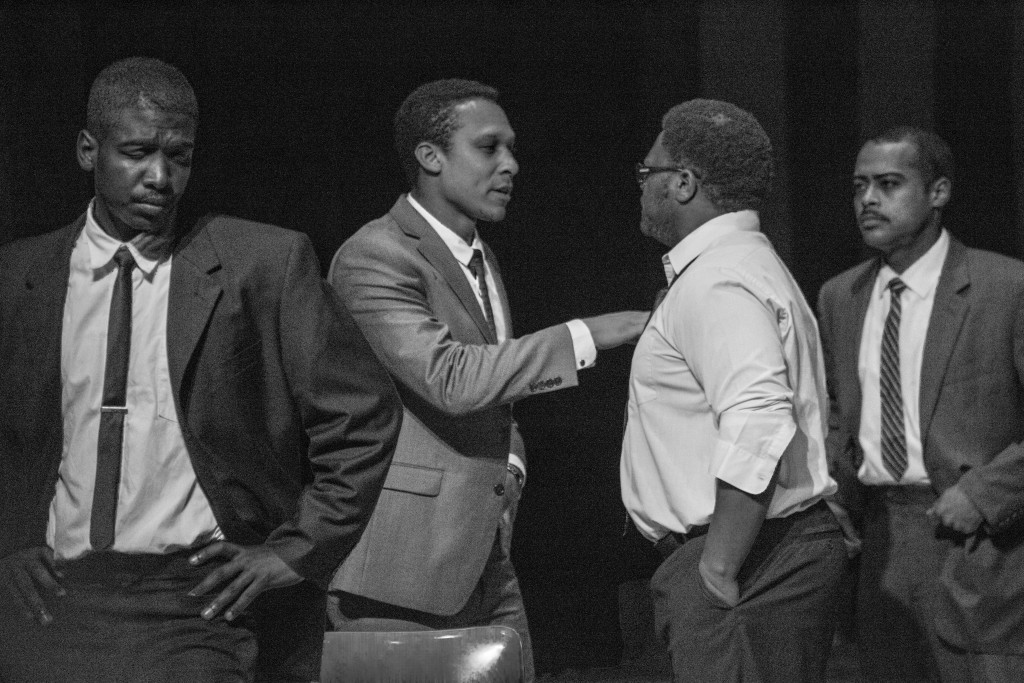“All the Way” Reflects Cynicism In American Politics

A INSIDE LOOK AT CITY COLLEGE’S NEW DRAMA
By Marco Siler-Gonzales
Nothing comes cheap in this country, especially social progression. In City College’s debut drama performance of “All the Way” on March 4 at Diego Rivera Theatre, the United States is a nation divided—a martyr must be made and a hero must take his place, because the spotlight is only big enough for one.
Written by Robert Schenkkan and directed by City College drama instructor John Wilk, “All the Way” depicts Lyndon B. Johnson’s (LBJ) accidental presidency after John F. Kennedy’s assassination, and further chronicles LBJ’s first year of presidency up to his election in 1964.
“Everybody wants power, but nothing comes free, especially not good.”
-President Lyndon B. Johnson
The Accidental President
President Johnson, played by Catz Forsman, is not the only main player in this period. Martin Luther King Jr., played by Rodger Lee, often shares the stage with the president, though they are not always in dialogue. The two actors often alternate their speeches in a coordinated routine, trading lines to help the audience absorb a dual commentary.
Both characters are tasked with convincing the American public to pass the Civil Rights Bill of 1964 and the Voting Rights Act of 1965. In order to convince the public to do so, each leader coerces his own political party.
The Dixiecrats pose the biggest threat to the president’s agenda and the cohesion of the Democratic party. Johnson seems to stand alone as the only Southern Democrat fighting for racial justice.
The Texas native often exposes his rural sensibilities, and Johnson’s impoverished upbringing serves as an important link between himself and the oppressed in Black America. He understands that his position was not entirely earned by will and skill, but rather also owed to the color of his skin.
“As a Southerner, I’ve had to bite my tongue on this issue my entire life until my mouth was full of blood. Well, not anymore,” Johnson said.
The Martyr
King must ease rising tensions between other leaders in the Civil Rights movement, but a lack of federal protection for voting rights activists in the South are pushing his peaceable movement to its limit. Subsequently, Director of the Federal Bureau of Investigation J. Edgar Hoover (played by Don Corbin) has a relentless vendetta against the civil rights leader.
King’s infidelity to his wife, Coretta Scott King (played by Merri Gordon), ultimately proves to be his greatest weakness and how his opponents tarnish his saintly reputation.
Right after the Civil Rights Act is signed into law, the narrative shifts toward King’s downfall and the clinching of Johnson’s legacy.
The play slowly picks apart King’s integrity through his own flaws by the powers that seek to discredit him.
“Everybody wants power,” Johnson said. “But nothing comes free, especially not good.”
Certainly, as Johnson seeks re-election, it is clear something must be sacrificed. The president grants Hoover permission to spy on King in wake of his fervent activism which Johnson fears will jeopardize his chance at re-election.
As Johnson takes the stage for his election victory, Coretta listens to the anonymously delivered sex tapes (undoubtedly by the FBI) of King’s various romantic affairs. Just before Johnson makes his victory speech, King walks shamefully off stage to chase after Coretta.
King’s humiliation contrasts with the president’s heroism. But it was under Johnson’s influence that Hoover sent those sex tapes to the King’s doorstep.
The spotlight chose LBJ.
The City College theatre department will present three additional performances at Diego Rivera theater, of “All the Way” at 7:30 p.m. on March 11 and 12 with a final performance accompanied by American Sign Language interpretation on Sunday, Mar. 13 at 2 p.m.
Contact a reporter
Send an email to: Marco Siler-Gonzales or tweet mijo_marco
